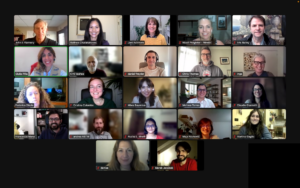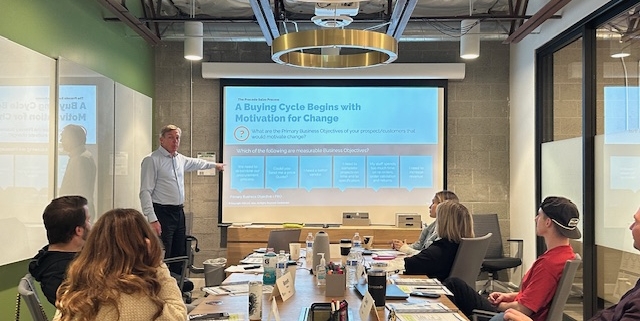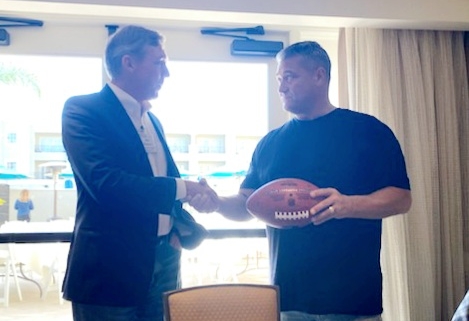You spent a lot of time building, delivering and coaching your commercial strategy for this year. And soon you’ll find out the results. To meet and exceed on a regular basis requires some fundamental execution. Click above to learn more.
One of the hardest parts of sales is keeping the pipeline filled with qualified opportunities. Nurturing leads is something salespeople put off. Akin to delaying the home maintenance project you perceive as time-consuming or the medical check-up that makes you uneasy – procrastination is a creeper But avoiding necessary actions can make things harder over the long term.
We know the importance of sustaining the pipeline and nurturing leads so why do we drag our feet? I’ll explain some reasons why as well as tell you how to prevent procrastination from taking root.”
So, what’s hanging us up?
- Time Constraints: Sales reps often face tight schedules and multiple priorities. Nurturing leads requires time and effort, which can lead to procrastination when other urgent tasks take precedence.
- Lack of Resources: Limited resources, such as manpower or tools for automation, can make lead generation seem like a daunting task.
- Focus on Immediate Wins: Low-hanging fruit. Some may prioritize pursuing new leads and immediate sales rather than investing time in nurturing existing leads, especially if they are focused on meeting short-term targets.
- Unclear Strategy: Without a well-defined strategy, sales teams may struggle to prioritize and execute consistent actions, leading to procrastination.
Being mindful of your circumstances and some of the classic reasons why we procrastinate can help reduce its occurrence. Here are some other ways to bury the tendency and continuously fill (not kill) the pipeline.
- Evaluate Current Customers: It is not uncommon for 60-70 % of new revenue to be generated from an existing customer base. These prospects are more likely to close in a timely, predictable fashion, and forecasting their revenue is typically more accurate.
- Assess the Lead’s Value: Whether a lead is given to you or organically generated, the most qualified leads are those with a personal connection. We are interconnected like no other time in history – personally and professionally. A quick LinkedIn search can reveal if you know someone within the company you are targeting. A cold lead instantly turns warm with an introduction from a mutual acquaintance.
- Weigh Progress with a Milestone: The velocity of water through a pipe depends on pressure. Likewise, it’s advantageous for salespeople to have some pressure – or triggers – to determine the pace of a deal from contact to close. This is especially true immediately following an initial customer conversation. Did the customer share any goals? If yes, spend more time pursuing that. A great forecasting tool is a Deal Map. This document identifies by date and responsibility a map of the deal. Buyer and seller agree to the terms and proposed timeline. When both parties are working off the same document, forecasting probability and close date are easy to determine.
Regularly evaluating and refining your approach will contribute to a more resilient and effective sales pipeline management strategy – leading to more confidence and less procrastination. As William Butler Yeats, one of the greatest poets of the 20th century, said, “Do not wait to strike till the iron is hot, but make it hot by striking.”
I am often asked by management teams to participate in their sales meeting. They look for me to provide feedback, as well as perspective, based on my customer experiences around revenue development. Many of these meetings incorporate team-building events – perhaps at a tropical location or golf resort – while others are more dialed down and focus on a theme such as setting the company’s vision. Whatever the atmosphere, I enjoy the opportunity to provide insight into customer needs, preferences and pain points while observing the company’s top performers.
Not long ago I reflected on what makes a good sales manager outstanding, after all, a terrific sales manager is central to the success of a sales team and the overall performance of a business. We know a manager’s primary role is to develop the sales rep and the sales rep’s main responsibility is to develop opportunities and win business.
But not everyone gets from A to B. Here are four skills that a sales manager must master to become great and keep the pipeline moving.
- Determine Objectives: I have seen managers who set objectives based on their personal experiences with no buy-in from their sales reps. Does this sound familiar? “All sales reps must call on five opportunities a week and make 20 cold calls a day.” While this method may work, a better approach is to establish objectives with your sales reps. For instance, “Here are the revenue objectives we are trying to meet this year. What do you think we need to do to achieve this objective?” Managers who can secure buy-in from their sales reps and set clear, well-defined objectives will foster amazing performance.
- Schedule Reviews to Share Agreed Upon Information:Once objectives are set and expectations are clear, what happens next? Letting your sales rep “wing it” is not the answer. It’s crucial to provide guidance and structure. If the objective is to win $500,000 of new business, you and your reps should discuss the types of customers they need to talk to. How many of each of those customers should they talk to to reach their goal? Are corporate systems in place where reps execute follow-up correspondences? Emphasize the importance of being proactive, addressing client needs and maintaining professionalism in all communications. Have reps share their customer touchpoints with you for accountability. Walking them through follow-up expectations and processes will create a framework for repeatable success.
- Evaluate and Coach: In my experience, you can learn a lot about a sales rep’s performance from a prospect’s reply to a follow-up correspondence. Are enough letters being sent to show an ample pipeline? Is the rep talking to the right people? Are customer goals clearly stated and can your service or product move the customer closer to those goals? Letters should tell all these things and more. After your evaluation, choose one or two skills to coach your reps on. Do more than that and your limited time together will feel jam-packed and your coaching will be overwhelming. Tackle one skill at a time to foster improvement. For example, try role-playing with a rep and listen to how he or she positions your company’s capabilities. Tackle another skill the next time you talk or meet and solicit feedback on how the skill is developing.
- Offer Feedback and Reinforce:Look for what your sales reps do well. You’ll need to continually reinforce the positive to maintain the foundation you are building on with your reps. If objectives have not yet been achieved, focus on what’s going right and how a particular skill helped to get them halfway there. Then, work together on skills that will get them the rest of the way.
American business magnate and philanthropist John D. Rockefeller said, “Good management consists in showing average people how to do the work of superior people.” By mastering these four skills managers will get superior people producing superior results.
If interested in developing these skills, reach out to learn more about our workshops and services.
Have you ever spent several thousand dollars (and then some) on training only to see no change or short-term boosts at best? If your sales training is striking out, it’s probably due to a lack of prep and follow-up. There are ways to achieve long-term positive changes through training but you’ve got to know what you’re signing up for and consider some clear-cut strategies.
For starters, different types of training accomplish different goals. Over the years we’ve been hired by clients for one-hour kick-off motivational keynotes, three-day intensive sales process training and everything in between. We’ve learned a few things along the way including – sales training conducted as an “event” simply doesn’t work.
If your goal is to transform your organization so that it’s achieving goals like increasing sales or increasing profit margin, the training itself is only 10% of the overall process. To make your training investment stick, consider the following before you spend valuable dollars.
You Need an Implementation Plan. Start your transformation with the end in mind. What metrics will be used to measure the success of the salespeople, manager and related team member(s)? Will leadership hold them accountable for achieving these goals? For example, to achieve 10% growth in revenue you’ve calculated that each salesperson needs to meet with one additional qualified prospect per day. The skill being developed is new business development. How will you hold each person accountable for that number? The measure of success could be an email the salesperson sends to the customer that summarizes their meeting. This is an auditable measure that a manager and a manager’s manager can use. The email not only provides quantitative measurement, but the leaders, and even the CEO, can review the email and see the quality of customer interactions. How well was the new skill captured in the follow-up e-mail? Does this contact meet the defined metric of adding one new qualified prospect per day?
Have a Strategy to Reinforce and Coach Learned Skills.
Sales skills that are enhanced or gained in a training session are 80% forgotten after the first 30 days. Why? When not practiced or measured with a 3rd party, there’s often little to no change in behavior. The formula for reinforcement is: a) apply the learned skill b) share results with the coach and then c) reinforce the behavior. For coaching, first get attendees to apply new skills in the field. This could be verbal or written sales skills – but only introduce one skill at a time. Then it’s time to coach. Ask specific questions about the desired outcome. For the example above, did the salesperson meet (or converse) with one new, qualified prospect a day? Frame questions that help them understand what went well and where correction needs to happen. Next, ask them how they can improve their results. Effective coaches help people find their own answers. Finally, ask what would happen if the next time they tried … and then insert a specific recommendation. Reviewing a video of someone good at executing a skill is a way to fine-tune a new sales method. Rehearsing a future conversation with a recording is also a good practice.
When changes are reinforced, salespeople will remember how inspired and motivated they were at training. And with effective measuring, they’ll know these skills and behaviors will be recognized.
When I’m retained by clients to help their sales team, the first thing I do is to ask to interview their top performers. My purpose is to decode their selling DNA and identify the markers that make them successful.
Invariably, effective salespeople sell value, not solutions or services. They recognize that it’s the ‘why’ that resonates with buyers – the business value. Equally revealing is illustrating how today’s problems impact the overall bottom line. But selling value and the total cost of problems facing a customer is where many sales teams run into trouble.
Pinpointing and helping customers articulate these positions may not come naturally but it’s a necessary practice if you want to meet or beat your goals. Top performers use the following three tactics to draw out the answers to business value and the cost of challenges.
- Get to the cost of today’s problem. Buyers face a number of problems and challenges. Great salespeople help buyers define – in totality – all of the costs these problems bring. While costs may be non-monetary, such as frustration or low morale, the numbers that hit the bottom line are those that are heard by every person involved in the buying decision. Great sellers shape and frame conversations around the costs of the buyer’s problems. This is especially important if the solution’s value comes with a higher price tag. Early conversations around costs will help sell more and ensure that the necessary margins are hit in the end.
- Tell stories. Stories help buyers discover for themselves the problems that they are facing and the solutions they need. High achievers have several stories at the ready that they can tailor and share based on the buyer’s situation or desired outcome. When the conversation lulls and the buyer is unable to explain their problem, share a story! Start by framing who the experience is about. Then identify the problem, turning point and resolution. Buyers who hear successes and failures of industry peers become more willing to share details about themselves and have an easier time finding their voice. Stories not only get to problems, they also help describe how others use and derive business value from your products. Stories have purpose and great salespeople use them again and again.
- Summarize conversations in writing. This is a tactic that all sellers tell me they do, but few do it well. I sell my services to many companies in different industries. I constantly refer to follow-up emails I’ve written after conversations. The emails sum up problems a client is facing and the associated costs, the solutions we discussed and their value, and of course, proposed next steps. These emails help the customer and I keep the focus on the problems we are trying to solve. Top performers don’t rely on memory. They simplify, write the plan down, share it with the customer and allow the customer to give feedback.
If you want to sell the business value your products bring, incorporate these techniques and the process will be habit in no time.
Many new sales managers think they are good at managing salespeople because they excel at selling. While selling may have come naturally to them, it’s not innate for everyone. And now, a frontline manager, it’s their job to recognize performance barriers and empower their reps.
But a promoted salesperson often has a hard time letting go of the adrenaline rush that comes from being in the action and chasing big deals. He or she may end up taking charge of a customer relationship and finish the sale, undermining a rep’s motivation and confidence. Equally problematic are first-line managers who expect everyone to produce the same exceptional sales results they delivered – but without providing any coaching or constructive feedback.
A recent report from Gartner found that the average sales manager spends only 21% of their time coaching – it simply gets pushed aside. Turnover becomes high in situations where businesses are not producing skilled reps who have learned to achieve revenue growth on their own. Progressive organizations, however, recognize that teaching managers how to deliver personalized coaching and training – which ultimately produces high-achieving team members – has a greater impact on overall sales performance than just training the sales reps alone.
We were recently hired by such an organization. Their new sales rep team was being managed by their superstar salesman – who was also new to the role. With his compensation tied to the team’s revenue numbers, it was understandable that he wanted to “make it happen.” He was involved in every account, micromanaging the reps, constantly asking for updates, solving problems, and often stepping in to save the sale as quarter-end approached. While the compensation was good for all of them, the manager was exhausted and the reps felt unappreciated, unmotivated, unfulfilled and eventually, unable to work under such conditions.
Major change was needed and teaching their first-line managers how to coach their direct reports on sales skills was priority one. We helped the organization link its sales process to practical, teachable selling skills, setting up a structure for skills coaching based on individual sales reps’ needs. The change came slowly but steadily. Because the managers were trained around conversations on current account strategies and within the parameters of their busy schedules, they developed muscle memory around their new coaching skills through practice with their teams.
Results followed, with an 11% increase in revenue from existing customers, a noticeable increase in the new opportunity pipeline, and a happier, more productive team. So remember, if you’re looking to drive sales productivity, make sure coaching is a part of your process.
Last month, I had the opportunity to visit the JFK Museum in Boston while on a business trip to the area. This visit had been on my bucket list for some time, and I had immersed myself in reading about President John F. Kennedy to prepare for the experience. Little did I know that the real essence of JFK’s leadership and service to others would come to life in a whole new way as I walked through the museum.
I was already aware of the pivotal moments in Kennedy’s life, such as his journey to the Oval Office, his role in the Cuban Missile Crisis, and his unwavering support for the Civil Rights movement. However, being at the museum allowed me to delve deeper into the complexity, danger, and the level of involvement he had in both these monumental events.
It would be odd not to be in awe of the pressure and responsibility that Kennedy faced during those harrowing days in October 1962. The world stood on the brink of nuclear war, and it was Kennedy’s leadership, his calm and measured approach, that steered us away from potential catastrophe. The crisis underscored the true test of a leader, showing how one handles adversity and the lives of millions hanging in the balance. Kennedy’s decision-making during this crisis demonstrated his resolve and his commitment to safeguarding not just American lives but the entire world.
The additional profound impact JFK had on shaping the world was through the establishment of The Peace Corps. While these two major crises unfolded in the 1960s, Kennedy was also laying the foundational work for the Peace Corps, which would go on to become a beacon of American goodwill and humanitarianism. This organization exemplified his vision of service to others, both domestically and internationally.
Visiting the JFK Museum was a powerful reminder of the enduring legacy of President Kennedy’s leadership and his unwavering commitment to service. His ability to inspire others to serve their country and the world is a testament to the kind of leadership that transcends time and continues to shape our world today. In an age where leadership and service are more crucial than ever, Kennedy’s example remains a beacon of hope and inspiration, one that would could certainly use in our next President.


There’s no doubt that sales training is an investment; but, when done right, it’s one of the smartest investments your company can make. Small improvements in selling techniques can make a huge impact on revenue. What would it mean to your sales results if your average reps were producing as well as your top performers?
We have 17 years of experience training sales teams, which means equipping them with the skills and tools they need to achieve sales goals. We are different from other training organizations because we don’t teach a one-size-fits-all course. Our curriculum is customized to your unique sales process and selling environment. Your reps will leave our course having learned and practiced the techniques they need to successfully engage with prospective customers to drive revenue.
We provide both in-person live sales training along with virtual sessions. While we love to engage in person with your teams, if you do opt for an online training experience, you can rely on our fine-tuned virtual event platform that allows you to maximize learning opportunities through group break out discussions, private and public chat features and a one-on-one coaching.
Whether you choose to hold your sales training in-person or virtually, take advantage of our Online Learning Portal which has helped hundreds of our customers’ salespeople reinforce what the sales skills they acquire in our workshops.
On the final day of their Sales Kickoff Meeting, Todd Massas, the Chief Commercial Officer for Harvest Small Business Finance, took the stage for their Awards Ceremony. This is something many organizations do to celebrate top performers and build momentum going into the new year.
During the previous two days, Flannery Sales Systems ran a Sales Process Workshop for Harvest, focusing on key selling skills they can use to improve their overall performance. We had a great time. Their participation was excellent, we were able to cover many of the challenges they face in the marketplace, and we put a plan in place for post Workshop coaching so they can continue to practice what they learned.
Back to the awards. Todd recognized many of his internal team members who produced big results and represented Harvest’s value offerings to the market—there are a lot of talented people on that team. Then, to my surprise, Todd turned toward me and began to describe the valuable contribution Flannery Sales Systems provided during the Workshop. He said he saw our services as being pivotal to their success in 2022 and invited me to the front of the room to receive a “game ball.”
I was floored. Over the years, there have been many nice things said about our team and compliments made in the form of referrals and invitations to events, but this one really impacted me. How thoughtful and kind for Todd to do this in front of teams that we had just trained, and what a powerful way to bring a partner company into the fold in a new capacity for Harvest.
Thank you, Todd and team, we are grateful for the recognition and look forward to helping your team continue to build selling competencies and provide excellent service to your customers in 2022.
In Hollywood, many films are based on true stories. Don’t let your revenue pipeline be one of them.
There are 3 macro criteria you should be looking at now (and a few subsets thereof) to determine if your revenue pipeline has enough in it to hit your goals for 2021. Listen in to this video for a description of each, and make plans to adjust if there needs to be more in development.







